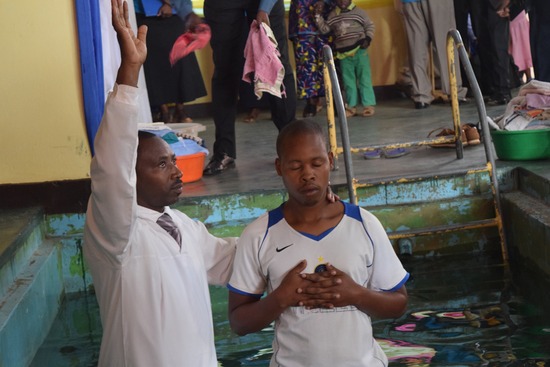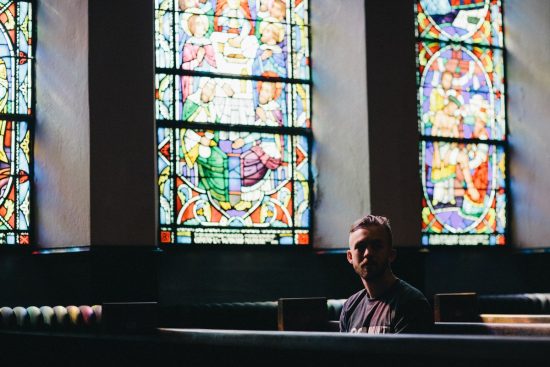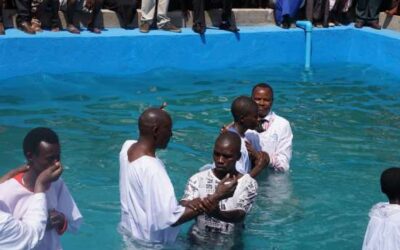Whether you heard about the Seventh-day Adventist Church through a traveling evangelist, during your online searches, or through a loved one or relative, you might be considering joining yourself.
There are a few steps involved in the process of becoming a member of the Adventist Church.
This is a process that happens as the Holy Spirit guides you. It’s best to not rush it. Let the Holy Spirit take you along at His pace for you.
You may not know much about God as you begin this journey, and that’s okay. That’s what it’s all about—learning about Him and His truth. You’ll want to pray often to talk to Him about what you are learning and thinking. And truly, we never stop learning about God and His goodness, no matter how long we have been Christian.
You may also already have a thriving relationship with God, which is wonderful! Coming to Adventism might be the result of God showing you further truth in the Bible.
But how exactly do you go about joining the church? Do you have to go somewhere or fill out a form?
In this article, we’re going to get into that. We’ll lay out the few steps you’ll want to follow, as well as why they’re important and some other common questions.
We’ll dig into:
- The steps to becoming an Adventist Christian
- How you know you’re ready
- Who is involved in the process to become an Adventist
- How long the process usually takes
Let’s start with what you want to know: the steps involved.
The steps to becoming an Adventist Christian

Photo by Nathan Dumlao on Unsplash
As we said before, the Holy Spirit will be your companion as you follow these few steps to becoming a Seventh-day Adventist. It doesn’t matter if you don’t know anything about God or have already developed a relationship with Him.
You’ll want to be careful not to treat these steps like boxes to check off just to say you did them. You want to be sure you resonate with the things you’re learning—do you believe in these things with your heart? To continue with the process, you’ll want to feel truly convicted.
Now let’s take a look at these steps!
Learn about Seventh-day Adventists
The first thing you want to do is learn about Seventh-day Adventists and their beliefs. As we already said, you never want to go into something blind. You want to spend time researching and understanding before making such a big decision.
You can learn about Adventists through other pages on this site or the church’s main website, Adventist.org. You can also read books published by Adventist publications like Pacific Press or the Review and Herald.
While you’re learning, you may also want to have a Bible on hand to study for yourself the things you read.
You can also request information from your local Adventist Church, which leads us to another step of the process.
Find your local church
When you have become familiar with Adventist beliefs, find your local church and attend Sabbath School and services one Sabbath. And this step doesn’t necessarily have to happen after the first step—attending church can help you as you learn about Adventists.
In visiting a church, you can get acquainted with the church members, who are always glad to have visitors! You can also meet the pastor or head elder.
Attending church also allows you to hear other beliefs you may not have come across in your initial reading.
Request Bible studies
The next thing you’ll want to do is request Bible studies. If you’ve attended your local church, you can ask the pastor or head elder, and they will be more than happy to study with you. You could also ask another church member or Bible worker at the church.
Why do Bible studies when you’ve already been learning about Adventism and the Bible?
This is a chance for you to do a deep dive into Adventist beliefs and how they line up with Bible teachings. You’ll go through the 28 Fundamental Beliefs and look at the core doctrines Adventists believe in. Some of these include the Second Coming, the Ten Commandments, and the state of the dead. You’ll also get a sneak peek at the history of the Adventist Church and its founders, like Ellen G. White.
Not only do you get a thorough, sequential study of the Word of God and Adventist beliefs, but you get to do it one-on-one with the pastor or another person studying with you. Here, you can ask any questions you may have. No questions are too silly! The person you are studying with wants you to ask questions because it means you’re thinking and want to know more.
When you finish your Bible studies, there aren’t any tests to “pass” them. They are designed to help you study God’s Word and build your relationship with Jesus Christ, not to pass a test. It is up to you to learn all you can.
Make the commitment

Once you feel you have a good, solid understanding of Adventist beliefs within the Bible, it’s time to officially commit yourself to your new beliefs. This is done through baptism.
Baptism is a public profession of faith—telling everyone openly that you have adopted belief in Jesus through the Adventist understanding of His Word. Baptism is a celebration—a wonderful time in your life.
In the Adventist Church, you’re baptized by immersion. This means you’re dipped totally underwater—the way the Bible instructs us to be.
On the technical side, baptism automatically makes you a member of the Seventh-day Adventist Church. This gives you a say in church matters and allows you to hold positions in the church, like deacon or treasurer.
If you have already been baptized by immersion into another Protestant denomination, you can also choose to make a profession of faith instead of being rebaptized.
A profession of faith is the same idea as baptism: it’s a formal declaration that you believe in Jesus and want to be part of the Adventist Church. You just aren’t immersed in water, like baptism.
Either at the same time or within the next weeks after your baptism or profession of faith, your church will likely have a reading, or public vote, on whether to accept you as a member. Don’t worry about this step: most people are eagerly voted in!
Why these steps are important
Following these steps is important because they help you understand more about the church you’re joining and the community of believers you’ll be a part of.
You’ll get to meet the head of the community—the pastor—and see how the church functions.
You’ll get to see how Adventists put their beliefs into practice daily. Not to mention you’ll get to learn what everything means and figure out the context behind everything you’ve heard or read.
All of these things will help you thrive in your new-found church community. This is why going through these steps is so fundamental.
But do you have to become a member to be a part of the church?
No, it’s not mandatory. But practically speaking, it’s a good idea if you want to be a part of the church to go ahead and become a member.
Logistically, membership helps keeps things organized in the structure of the church and the General Conference, the worldwide representative body of the church. We live in a world of databases and systems, so having a membership makes it easier in church structure.
But most of all, there is something special about membership. It makes a person feel especially connected to a community and prioritize their commitment there. When you become an official member, you are more likely to be involved, and because of your involvement, you’ll likely feel more like a part of that church family.
How you know you’re ready
As we’ve said earlier, there is no magic formula to determine when you’re ready. You don’t have to be a certain age or a certain economic status. People of all ages, from children to high school age to older people join the church, and people of all walks of life and economic status are welcome.
The Holy Spirit works on our hearts in its own time, little bit by little bit, guiding us to the truth as we are ready to receive it.
But it’s important to be sure of a few things before you make the commitment. You’ll want to accept the Lord Jesus as your Savior, and thoroughly understand our fundamental beliefs as the Bible teaches them, as we outlined in the steps above.
And, most importantly, you will want to feel really convicted of these things. You don’t want to become a member just because your spouse or friend did. You must personally want to believe in your heart the Biblical truths shown to you.
Who is involved in the process to become an Adventist
Normally, this will be the pastor, elder, or Bible worker in your area or local church. They will study the Bible with you and answer any questions you have along the way.
But other support can be great too! Any big decision can be a little stressful. If you have any relatives or friends who are Adventists, go to them for emotional support.
Also, new friends you’ve made at your Adventist Church will gladly give you support and help answer your questions. They will help you feel at home as you go through this big transition.
How long the process usually takes
There is no set time for when to complete the process of becoming an Adventist. It isn’t something that happens at the snap of your fingers. It takes time to learn and study everything.
When we’re learning what Scripture says, we are learning about God (John 1:1). Since God has existed forever, even a lifetime of Bible study is not enough to learn everything about Him. An introductory Bible study, like what you’ll take with a pastor, elder, or other trusted church members, will take time.
For everyone, it’s different. Some complete this process in a few weeks. For others, it takes several months or a year. For others, it might take longer. It depends on your pace.
If you’re chomping at the bit, wondering why certain aspects might be taking too long, keep in mind that God knows what’s best for us. In the New Testament, Jesus tells His Disciples that He knows even when a sparrow falls, and a human is so much more important than a sparrow (Matthew 10:29-31).
Let God work at His own pace, and He will do wonderful things in your life.
The important thing is to focus on what you’re learning, not how long it’s taking.
Becoming a Seventh-day Adventist can’t be a decision of a moment. It’s something that can come only after meditative study of the Bible and inner acceptance of the beliefs presented.
It’s about the state of your heart.
The process we discussed helps you get a well-rounded introduction to the new life you’ll find in Adventism through belief in Jesus.
If you want to learn more about the public commitment to Adventism and what it signifies,
Related Articles
More Answers
All about Adventist Elementary Schools
The Seventh-day Adventist Church operates the largest Protestant education system in the world. A big part of this system is our K-8 elementary schools, or primary schools, as they’re known in other parts of the world.
What Adventists Believe About Spiritual Gifts in the Bible
Seventh-day Adventists believe that spiritual gifts are talents that the Holy Spirit gives to believers and followers of Jesus Christ. These gifts are different but complementary, and they often equip followers of Christ with the ability to spread the good news about Jesus and encourage its members.
What Seventh-day Adventists Believe About Christian Growth
Christian growth is the experience of allowing Jesus Christ to work in our lives through the Holy Spirit and restore in us the image we were designed for—God’s image of selfless, other-centered love.
Why Is Water So Important?
We all know that water is a substance we can’t live without. It quenches our thirst and keeps us hydrated on the inside. And it’s necessary for hygiene and cleansing on the outside too.
Everything You Need to Know About Sabbath School
Sabbath School is the Bible study component of the church program at most Seventh-day Adventist Churches. It’s a time of Bible study on a specific topic or lesson. Instead of listening to a preacher, people interact with one another, making it a great opportunity for building friendships.
How to Calm Anxious Thoughts, Using the Bible
How to Calm Anxious Thoughts, Using the BibleYou were expecting a phone call from your daughter half an hour ago, and she still hasn’t called. She’s also not answering your calls. You feel your heart thumping as your thoughts race: What if she’s been in a car...
What You Should Know About the Adventist Health Studies
But what you may not know is that Adventists have been the subjects of long-term research into lifestyle and health. Since 1958, researchers from Loma Linda University School of Public Health have conducted five cohort studies. Collectively, these studies are known as the Adventist Health Studies.
Is it necessary to attend church to draw closer to Christ?
While you certainly don’t have to go to church to develop a relationship with Jesus, the Bible makes it clear that gathering together with other believers can be really beneficial for your spiritual growth.
The Creation of the World: What the Bible Really Says
When we think about the biblical Creation story, we think of just that: the world being created by the Creator. And while God’s creation of the world is marvelous and miraculous in its own right, it’s about far more than the sudden appearance of plants, animals, and humans.
William Miller
William Miller was a farmer in the early 1800s who gave his life to God and began intensely studying his Bible.
What Is Vespers?
Friday rolls around, and you’re spending time with your friends or relatives when they mention they’re going to vespers this evening.
Do Seventh-day Adventists Believe in Medical Care?
Adventists talk a lot about health principles and disease prevention. But how do we handle sickness and medical needs when they inevitably come along?
Individual or Group Bible Study—Which Is Better?
They’re both great, of course! But depending on where you’re at and what your goals are, it’s worth looking into the different benefits of each.
What do Seventh-day Adventists Believe about The Great Controversy?
The Bible unveils a supernatural struggle between good and evil which Adventists often refer to as “The Great Controversy.”
Do You Have to Be Vegetarian to Be Adventist?
Of course not. Membership in the Seventh-day Adventist Church has never included any dietary requirements.
Who Were the Israelites in the Bible?
The Israelites in the Bible, also known as the children of Israel or ancient Israel, were a nation God called to represent Him to the world. They come from the line of Abraham, whom God first made a covenant with, promising to make his descendants into a great nation (Genesis 12:1-3).
Joseph Bates
Joseph Bates was a sailor-turned-preacher who joined the Millerite Movement and waited for Jesus to come in 1844. Despite being disappointed when this didn’t occur, Bates held onto his faith and played an enthusiastic and integral part in starting the Seventh-day Adventist Church.
How Do Adventists Do Baby Dedications?
For Christians, dedication ceremonies for babies are a special and memorable time for parents and the church. They often happen during a congregation’s main worship service when parents present their child before God and the church community, similar to how families did in the Bible.
Bible Translations
Bible Translations—Which English Language Version is “Best”?The most accurate Bible possible would be one that’s printed in its original languages—Hebrew and Greek. But since most of us are not Hebrew or Greek scholars, the next best option is to find a Bible...
What’s the History of the Bible? A Complete Overview
The Bible is the number one bestseller in the world of all time.1 It’s translated into thousands of languages, read by people of all ages and backgrounds.
false vs true prophets
Have you ever wondered how people in Bible times were able to tell if their prophets were actually from God?
How Important is a Weekly Sabbath as a Day of Rest?
Around the world, different religious groups have had a Sabbath—a day set apart for rest each week. A day to worship together, spend time with loved ones, and to just rest.
12 Practical Ways to Overcome Worry and Fear
12 Practical Ways to Overcome Worry DISCLAIMER: This content is for informational purposes only. It does not constitute any professional medical advice and is not intended as a substitute for professional mental health therapy. It’s easy to get stuck in a cycle of...
What is the Great Controversy?
Children starving. Helpless civilians caught in the crossfire of war. A loved one dying of cancer.
Ellen G. White’s Counsel on Christian Education
Ellen White, a co-founder of the Seventh-day Adventist Church, saw that the educational system during her time was lacking and looked for ways to improve it—not only in the United States but throughout the world. And as part of her life of ministry, she sought out practical ways to be better stewards of our minds, bodies, and the lives we’re given.
What Was Ellen G. White’s Counsel on Music?
At its core, music is a collection of tones, sounds, and rhythms that creates a melody. It’s also much more than that.
What Are the Beatitudes (And What Do They Mean)?
The Beatitudes, found at the beginning of Jesus’ Sermon on the Mount in the Gospel of Matthew, are Jesus’ kingdom manifesto. They describe the way His kingdom works and what it means to be one of His followers.
What do Seventh-day Adventists Believe about Baptism?
Like many Protestant Christians worldwide and throughout history, the Seventh-day Adventist Church believes in baptism, a ceremony in which individuals go under water to publicly demonstrate dying to an old life and beginning a new life in Christ. We baptize people by immersion, as taught and exemplified in the Bible.
15 Examples of Prayer in the Bible
Prayer is the primary way we maintain our relationship with God. It’s our method of communication, and He miraculously hears every word that comes from our hearts.
Didn’t find your answer? Ask us!
We understand your concern of having questions but not knowing who to ask—we’ve felt it ourselves. When you’re ready to learn more about Adventists, send us a question! We know a thing or two about Adventists.
































